News
Does Insurance Cover Your CPAP Machine?
wp:paragraph If you suffer from sleep apnea and use CPAP therapy to help you sleep at night, then you will probably know that the machine and all of the necessary parts for it can be extremely costly. /wp:paragraph wp:paragraph Your sleep is vital to your overall well-being, therefore investing in it is worthwhile, however, your wallet may not be feeling the same way. Luckily, you may be able to get some or all of the costs of CPAP therapy covered by health insurance or government assistance programs, but it is important to do your research and double-check to see whether this is something that applies to you or not. /wp:paragraph wp:paragraph What kind of coverage could I get? /wp:paragraph wp:paragraph Most provinces in Canada have programs in place that can assist with some or all of the cost of a CPAP device. In Ontario for example, there is a program run by the Ministry of Health called the Assistive Devices Program (ADP) which typically covers 75% of the costs of the CPAP machine and parts. Other provinces may only cover certain CPAP parts while others offer no coverage at all. You may also be eligible for some funding at a national level, such as Veterans Affairs. /wp:paragraph wp:paragraph If you have your own health insurance, there are many policies that can cover some or all of the costs of a CPAP device. Be sure to read your policy carefully and/or contact your insurance agent to find out what is covered and what is not. /wp:paragraph wp:paragraph What is required? /wp:paragraph wp:paragraph For any government-funded coverage, you will require a valid health card in your name. Also, you must have a prescription or a doctor's note stating that you have been diagnosed with sleep apnea and require a CPAP device for treatment. /wp:paragraph wp:paragraph What if I need a part replaced? /wp:paragraph wp:paragraph CPAP parts do wear out after some time and will need to be replaced, but only within a specific timeframe. Make sure you read into how often you are allowed to replace your parts and still have it covered. /wp:paragraph wp:paragraph Hold on to ALL receipts from the purchases of any new CPAP parts, even if it’s covered. It will also help to write down the dates that the parts were purchased, that way you can keep track of how long you have had each part and when it is time for them to be replaced. Keeping your CPAP machine and parts clean on a regular basis will help to extend their lifespan as well! /wp:paragraph wp:paragraph Be sure to visit papsmart.com for your CPAP therapy needs. /wp:paragraph
about Does Insurance Cover Your CPAP Machine?Back to School Sleep Tips
With the summer winding down and the start of the school year just around the corner, the late nights and the bad habits that come with the summer holidays will soon be coming to an end. Whether you work at a school as a teacher or support staff employee, or you are getting your own kids ready for the school year, getting enough sleep is important. Adults typically need around 7-8 hours of sleep per night while children need to sleep longer (around 9-10 hours) in order to nourish their growing bodies. Here are a few ways both adults and children can adjust their sleep routine for the coming school year. Start the transition sooner If you or your kids have become used to later nights this summer, start at least a week before school starts and move bedtime up gradually by a little bit each night. Try to also make sure to wake up at the time that you will need to get up for school. Routine is Important! Make sure you establish a proper bedtime routine and stick to it! This is especially important for children, who need a routine and consistency in their day. Try and practice this as much as possible before school starts. Put the devices away Make sure to turn off the TV, tablets, laptops, and other devices before bedtime and keep them out of the bedroom to promote healthy sleep. The blue light from a lot of devices is bad for anyone, but especially for children whose brains are still developing, not to mention this will keep them awake longer and throw off the entire bedtime routine. Practice healthy habits Make sure you eat healthily and stay active throughout the day as this will help both adults and children to sleep well at night. Avoid consuming caffeine, alcohol, or energy drinks when it is almost bedtime.
about Back to School Sleep TipsFive Sleep Tips for Shift Workers
wp:paragraph Do you work irregular hours (or overnight shifts) and find yourself struggling to maintain a sleep schedule? You are not alone. There are many people who don’t work the typical 9-5 hours, therefore they do not always sleep at the same time every night. Sleep is essential for you to be at your best, especially at work, so it is important to make the most of the sleep you can get, no matter what time of day it is. /wp:paragraph wp:paragraph While it may seem easier said than done, there are ways to help you sleep better even if you are working an irregular schedule. Here are a few tips to make the most of your sleep if you are a shift worker. /wp:paragraph wp:list {"ordered":true,"type":"1"} Limit Caffeine /wp:list wp:paragraph One cup of coffee is okay at the start of your shift, and maybe a small cup every 1-2 hours, just to keep you awake during your shift but try to avoid caffeine at least 3-4 hours before bedtime. /wp:paragraph wp:list Create the perfect sleeping environment /wp:list wp:paragraph If you need to sleep during the day, keep your bedroom or designated sleeping area as dark as possible (blackout curtains would work best for this) and keep the temperature of the room on the cooler side. /wp:paragraph wp:list Limit Distractions /wp:list wp:paragraph Keep your phone and other devices on silent and ask other members of your household not to disturb you while you are sleeping unless it is an emergency. /wp:paragraph wp:list Follow a routine /wp:list wp:paragraph Make sure you follow the same bedtime routine when going to sleep, even if it is the daytime or your schedule is inconsistent. This will help your body to wind down and prepare for sleep. /wp:paragraph wp:list Set boundaries /wp:list wp:paragraph If at all possible, try to place limits on the amount of overnight shifts you take on, as the irregular schedule can be hard on your body. If this cannot be avoided, this is where having a routine will be extremely important. Speak to your doctor if you are experiencing multiple episodes of insomnia or other sleeping problems. /wp:paragraph
about Five Sleep Tips for Shift WorkersUsing CPAP Machine in the Hot Weather
wp:paragraph Summer may officially be around the corner, but for many places in the world (especially in some parts of Canada right now), the hot and sunny weather had already arrived in full force and many of the days are long and warm. While this may get you excited for all of the good things about summer, you may be dreading the sleepless nights that come with the hot and sticky weather, especially if you suffer from sleep apnea. /wp:paragraph wp:paragraph No one enjoys the uncomfortable feeling of trying to sleep when it’s hot, especially if you wear a CPAP machine at night. While you may be tempted to skip your CPAP therapy just for a night or two, don’t do this! Not only will your sleep apnea symptoms get worse, you will have even more trouble sleeping than you did before, which can make you feel tired and groggy during the day. /wp:paragraph wp:paragraph Six tips for surviving the heat with your CPAP machine: /wp:paragraph wp:list {"ordered":true,"type":"1"} Keep your bedroom cool: use a fan if necessary to properly circulate the air in the room and consider using blackout curtains to trap the cool air in the bedroom. Limit any excessive moisture in the bedroom: warm weather only adds moisture to the air, which can make sleeping very uncomfortable. If your bedroom is humid, consider getting a dehumidifier for the room. If your CPAP machine has a humidifier feature, you may want to turn this down for the warmer months. Clean your CPAP machine regularly: not doing so can lead to mold growth and the oils and sweat from your body can cause the parts of the mask to break down quicker than normal. Any padding with your mask may also need to be replaced a little more frequently. Check out CPAP Supplies and Accessories - PAPSmart Canada for replacement of your CPAP parts. Keep your sleep schedule consistent every night and don’t deviate from your sleep routine! Now is more important than ever to practice proper sleep hygiene. Stick to healthy diet and exercise habits during the daytime: also be sure to practice safe sun habits such as wearing sunscreen. Speak to your doctor for tips if you are still having trouble sleeping in the hot weather at night. /wp:list
about Using CPAP Machine in the Hot WeatherThe Importance of Cleaning Your CPAP Device
wp:paragraph If you suffer from sleep apnea and you regularly use a CPAP Machine at night, you may be used to the fact that you have to keep your device clean on a regular basis. Not sticking to a regular cleaning routine for the various parts of your CPAP Device can result in the parts breaking down and wearing out much more quickly than they are supposed to. Having to replace some of these parts can be extremely costly. Worse, your CPAP therapy may not work to its full potential if the machine parts go too long in between cleanings. /wp:paragraph wp:paragraph However, if you take the time to clean your CPAP machines and its parts of dust and facial oils, the parts can last you quite a long time before requiring replacement and overall, the CPAP therapy will work the way it’s supposed to. /wp:paragraph wp:paragraph How often do I need to clean my CPAP device? /wp:paragraph wp:paragraph CPAP Devices and their parts can get dirty very quickly as a result of dust and facial oils. Most parts will benefit from a clean at least once a week, however some parts such as the headgear cushions, tubing and humidifier chamber may need to be cleaned daily, especially if they are touching your face. /wp:paragraph wp:paragraph A few tips for cleaning your CPAP device and parts /wp:paragraph wp:list Check the manufacturers warranty for specific cleaning instructions Take the mask apart to give it the best clean Hand wash the parts of your mask using lukewarm tap water, a soft bristle brush and a mild soap Do not use any soaps containing harsh chemicals such as bleach or alcohol. A mild medical grade soap will do just fine (some mask manufacturers may offer a cleaning solution for their CPAP devices) Do not wash your mask parts in a washing machine or dishwasher and do not leave them in direct sunlight to dry Wash your face before using the mask in order to keep it clean and prolong its life If you notice any parts with cracks or other deficiencies, be sure to have the part replaced as soon as possible! /wp:list
about The Importance of Cleaning Your CPAP DeviceSix Ways to Give Your Sleep Routine a Little Spring Cleaning
wp:image {"id":6961,"sizeSlug":"large","linkDestination":"none"} /wp:image wp:paragraph Now that the snow has gone away and the days of warm weather are just around the corner, you may be gearing up to do a little spring cleaning in your life. Why not do some spring cleaning with your sleep routine as well? There are many reasons as to why your sleep routine may be feeling a bit off these days. Maybe you are tired of the pandemic and can’t stop thinking about all of the news, maybe those spring allergies are starting to creep in, or maybe your body never fully adjusted from that spring forward time change that occurred a few weeks ago. With the following six tips, you can find yourself going into the warmer weather with a restful sleep. /wp:paragraph wp:list {"ordered":true,"type":"1"} Turn your bedroom into a sleep only zone; avoid using your bedroom for anything other than sleeping and keep the room cool, dark and quiet. Blackout curtains and a noise machine can be helpful with this. Establish a bedtime routine and stick to it; this way your body knows to wind down and prepare for a good night’s sleep. And make sure you go to bed around the same time every night. Avoid technology for at least an hour before bedtime; that blue light effect from your phone does not have a good effect on your REM sleep cycle, so it’s best to put your devices away and read a book instead. Bonus tip: leave your devices to charge in a different room so you are not tempted to look at it. Be careful of what you eat or drink before bedtime; avoid alcohol, heavy meals or any caffeinated drinks for at least a few hours before you go to bed, as these are all known to keep you awake. Try a cup of herbal tea instead. Take advantage of the sun; Now that the weather is getting warmer, try and get outside for a little Vitamin D during the daytime. This has been known to do wonders for your body’s internal clock and your REM sleep cycle. Get in some exercise during the daytime; Although this may seem more difficult right now with the pandemic, even 30 minutes of daily walking around the neighborhood has been known to help you sleep better at night. /wp:list
about Six Ways to Give Your Sleep Routine a Little Spring CleaningCPAP and COVID19: Your Questions Answered
wp:paragraph If you have Sleep Apnea, you may be worried about CPAP and COVID19. Take a read below for tips and info. /wp:paragraph wp:paragraph Does having Sleep Apnea make me high risk for COVID19? /wp:paragraph wp:paragraph There is no evidence linking sleep apnea with coronavirus risk. According to the centre for disease control (CDC), People who have a higher risk for severe illness from the coronavirus include: /wp:paragraph wp:list 65 years of age or older Those with serious underlying medical conditions. Those who are immuno-compromised Those who have been close contact with another person who has the coronavirus. /wp:list wp:paragraph What should I do if I have symptoms (should I use my CPAP while sick)? /wp:paragraph wp:paragraph If you have symptoms of the coronavirus, you should isolate yourself in a separate bedroom and use a separate bathroom, if available. In this “recovery room,” you should continue to use your CPAP while you sleep alone. Evidence suggests that use of CPAP is more likely to produce large droplets (>10 μm) rather than aerosols, and that these are largely confined to within one meter due to their large mass.This suggests that the risk of droplet dispersion as a result of use of CPAP is not a major issue, and is probably no different than any COVID-19 patient in the who is coughing or sneezing without CPAP. /wp:paragraph wp:paragraph Any extra cleaning tips? /wp:paragraph wp:paragraph The centre for disease control (CDC) recommends cleaning and disinfecting your medical equipment according to the manufacturer’s instructions. The directions for CPAP masks and hoses normally include regular cleaning with soap and water. /wp:paragraph wp:paragraph The CDC also recommends that you clean and disinfect frequently touched surfaces in your household. This includes door knobs, light switches and handles. Learn more from the CDC about how to clean and disinfect your household. /wp:paragraph wp:paragraph /wp:paragraph wp:paragraph /wp:paragraph wp:paragraph Newly diagnosed with OSA and need CPAP? Shop CPAP, CPAP Masks, and Accessories Now! /wp:paragraph
about CPAP and COVID19: Your Questions AnsweredFestive Season 2020 - CPAP Tips
wp:paragraph It's going to be a very different festive season this year. Not as much cooking and shopping and going out to holiday gatherings as we're used to. While we can still find ways to have fun in our social bubbles, the stress of 2020 can also get exhausting. That's why getting enough quality sleep is more important than ever. /wp:paragraph wp:paragraph If you use a CPAP machine to help address your sleep apnea, you may be inclined every so often to skip using it. After all, the 2020 holiday season could make you just want to slip quickly into bed for some sleep. But definitely don't fall into that habit! No matter how enticing your bed may be, always take a few minutes to set up your CPAP machine for use at night. /wp:paragraph wp:paragraph Here's why... /wp:paragraph wp:paragraph You may think that missing one night here and there, especially during the holidays, won't really make a difference in the long run. But what you are doing is setting up the foundation for the habit of not using your CPAP machine. When you don't use your machine - even for one night - you run the risk of having a poor quality sleep. As you gradually become more and more fatigued, you can increase your risks for irritability, headaches, forgetfulness, and even more serious issues such as heart attack or stroke. And more immediately, those headaches and fatigue will mean that you will have less fun during the holidays. And who wants that? /wp:paragraph wp:paragraph So even when you don't feel like it, always be sure to use your CPAP machine to encourage yourself to be the best version of you any time of the year. /wp:paragraph wp:paragraph Newly diagnosed with OSA and need CPAP? Shop CPAP, CPAP Masks, and Accessories Now! /wp:paragraph
about Festive Season 2020 - CPAP TipsBack To School Season Sleep Tips
wp:paragraph Whether you are a parent, a student, a grandparent or a teacher, back to school time means a shift from a relaxed summer schedule to the regular school routine! If you had a great summer with plenty of downtime, then returning to school can be a bit of a shock. And those changes can affect a crucial component of your (or your child's) academic success: your sleep. So here are five tips to help you adjust back into your school routine and make sure you can focus on great sleeps: /wp:paragraph wp:list {"ordered":true} Get used to the routine: Instead of cramming into a new sleep schedule, gradually adjust towards your school one. Slowly change your summertime sleep patterns until it comes close to your new one. Weekend = weekday: This can be a difficult one, especially for students, but try to keep your weekend sleep schedule as close to your weekday one as much as possible. Your body operates best with a routine! Put down the phone: It's hard to sleep when friends and classmates keep texting. So when you want to sleep, put that phone away in a different room so that you can focus on sleeping. Nutrition: Wings and chips are tasty, but too many treat foods will affect your ability to sleep. Limit the treats and the caffeine, especially later in the day. Make it relaxing: What helps with a good night's sleep? A comfy bedroom. Make sure your room is dark, quiet, and somewhat cool. This will encourage your body to sleep and stay asleep. Happy snoozing! /wp:list wp:paragraph Newly diagnosed with OSA and need CPAP? Shop CPAP, CPAP Masks, and Accessories Now! /wp:paragraph
about Back To School Season Sleep Tips





